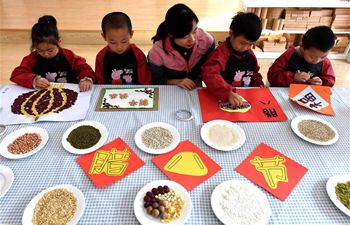BEIJING, Jan. 3 (Xinhua) -- Chinese scientists recently launched a program to map the genomes of about 10,000 representative species of protists and establish a large-scale database of protist genetic resources.
The program was jointly launched by the Institute of Hydrobiology of the Chinese Academy of Sciences (CAS), Tibet University, Henan Agricultural University, the Lanzhou Veterinary Research Institute of the Chinese Academy of Agricultural Sciences, the CAS Beijing Institute of Genomics and Huazhong University of Science and Technology.
A protist is a single-celled organism of the kingdom Protista, such as a protozoan or simple alga. More than 60,000 protist species have been described, and the number of unknown species is hard to estimate.
Protists are not only an important component of water ecosystems, but also an excellent source of food and nutrition for aquatic animals and humans. However, some toxic algal blooms in rivers and oceans may bring serious environmental problems, said the scientists.
At the same time, some protists are major pathogenic parasites of humans, livestock and aquatic animals, such as Plasmodium.
However, there had previously been no large-scale genome program for protists in the world. So far, genome data of only about 400 protist species have been published, said Miao Wei, deputy director of the CAS Institute of Hydrobiology.
The genome project will be based on the more than 3,000 species of eukaryotic algae and protozoa kept by the research institutes participating in the program, and more samples will be collected.
The scientists aim to complete the genome sequencing and analysis of about 10,000 protist species in three years.
The project is expected to help scientists better understand the mechanism of biodiversity, the origin and evolution of multicellular organisms and sexual reproduction, and to push forward the research on environmental protection, nutrition and disease control.

















